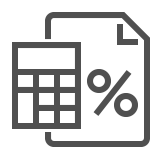FHA Home Loans
Move in with a lower down payment
Saving for a down payment on a home can be hard! Our FHA loans may be the best choice for buyers who are tired of renting, purchasing a first home, have less than perfect credit, or need a smaller down payment option. You can finance up to 96.5%.16
Product Features
-
Down Payment As Low As 3.5%16
-
Gifts and Alternate Funds Allowed for Down Payment
-
Lower Credit Score Requirements Available
-
More Relaxed Debt-To-Income Ratios
-
Expanded Co-Borrower Options
- Fast Pre-qualification Decisions, Online or Over the Phone
- No Intangible Tax21
- SCCU Member Service for the Life of the Loan
- SCCU Interest Rate Guarantee18
| Terms |
15 and 30 Years |
|---|---|
| Application Fees |
None |
| Pre-payment Penalties |
None |
| Intangible Tax |
None |
| Origination Fee |
$1,100 plus .25% of loan amount |
| Term | Rate "As Low As" | APR* "As Low As" | Example Loan Amount | Example Monthly Payment |
|---|---|---|---|---|
| 15 Years | 5.125% | 5.266% | $300,000 | $2,391.96 |
| 30 Years | 5.875% | 5.960% | $300,000 | $1,774.61 |
Example monthly payments do not include taxes and insurance, and the actual payment obligation will be greater.
HOME LOANS: Rates based on creditworthiness. Mortgage loans are originated by Space Coast Credit Union and are subject to credit approval, verification, and collateral evaluation. Programs, offers, rates, terms, and conditions are subject to change or cancellation without notice. Certain restrictions apply. Taxes and insurance not included; your actual payment obligation will be higher.
These mortgage loan programs constitute first mortgage liens secured by the home and property. Your down payment is determined by the Loan-to-Value ratio. (90% LTV = 10% down payment). Loans exceeding 80% of the appraised value of the home require private mortgage insurance. Member responsible for any funds needed for closing costs and pre-paid escrow.
Frequently Asked Questions
Unlike conventional loans, FHA loans are backed by the Federal Housing Administration, which is the world's largest mortgage insurer. The FHA backs lenders should the borrower default on the mortgage, but it does not lend money. According to hud.gov, the FHA operates from self-generated income at no cost to taxpayers. Nearly 8 million single-family mortgages are insured by the FHA, and lenders must be FHA-approved.
FHA loan rates are typically lower than conventional mortgage loan rates, but the interest rate is not the only factor to consider when weighing costs. An FHA mortgage requires an annual mortgage insurance premium in the range of 0.45 to 1.05 percent and a mortgage insurance premium paid upfront of 1.75 percent. Mortgage insurance premiums (MIP) are now also required for borrowers with a loan-to-value of 78 percent or more, and it may stay in place for the life of the loan depending upon the specific terms of the loan. When comparing FHA loans to other types of loans, It's important to consider all of the costs associated with each type, both at closing and over the life of the loans.
We make applying for all of our mortgage loans as easy as possible, with a fast pre-qualification application online or over the phone. To get started, please apply online or contact us by phone.
As with any type of mortgage loan, applicants must be able to meet certain requirements in order to be able to qualify for an FHA mortgage loan. These include:
- Down payment amount
- Credit score and creditworthiness
- Debt-to-income ratio
Each individual FHA-approved lender will also have its own specific qualification requirements, including different credit scores or debt-to-income ratios. For information on applying for an FHA loan at Space Coast Credit Union contact us and a Team Member will be happy to assit.
FHA loans are available to buyers of all kinds, including those with higher incomes. There is no minimum income borrowers must have, but they must have sufficient, steady income to ensure they can afford the loan, just as with other types of mortgage loans, and the lender must be able to determine that you are likely to maintain a certain level of income in the future. Other requirements include an adequate down payment (at least 3.5 percent) and a qualifying debt-to-income ratio. For information on Space Coast Credit Union's FHA mortgage program, please contact us.
The individual FHA mortgage lender ultimately determines some FHA loan requirements, and credit scores are one of them. In general, we look for a minimum credit score of 600. As a rule of thumb, the better your credit score, the lower your down payment requirement.
There are several factors to consider when determining which FHA mortgage lender is the best for you. When comparing lenders, remember that although the FHA has set forth certain requirements, individual FHA-approved lenders will have their own qualification criteria. For example, there may be differences in requirements for your debt-to-income ratio, credit score, and overall creditworthiness. Lenders may also have varying interest rates and fees.
FHA mortgages have plenty of advantages for all types of borrowers, but as with any loan, there are disadvantages. Depending upon your individual circumstances and the property you wish to buy, these disadvantages may include:
- Housing requirements: Minimum standards for protecting occupants' health must be met, and the property must be appraised and inspected to ensure it is structurally sound. FHA loan inspections are known for being especially stringent, so homes that are priced low because they're in need of significant repairs will probably not be an option for financing through an FHA loan.
- Mortgage insurance premiums: This monthly fee, also referred to as MIP, is in place to insure the FHA loan against the losses they may result from defaulting on the loan. Typically, borrowers must pay a 1.75% mortgage insurance premium at closing, and an additional range of 0.85% of the loan value each year for the life of the loan.
An FHA mortgage may also not be right for you if you are delinquent on your federal taxes, student loans, and other types of debt or have had a recent bankruptcy or foreclosure. You will have to wait three years to apply if you've experienced a foreclosure, or two years after a bankruptcy.
Your debt-to-income (DTI) ratio is a factor in qualifying for any type of mortgage financing. DTI is calculated by adding together your monthly debt payments and determining what percentage of your pretax income is spent on these obligations. Currently, the FHA requires a 50% or less debt-to-income ratio.
The specific amount you may borrow varies by county, and the loan limit in your area is based on home prices. These limits change nearly every year, but recent limits are approximately $314,000 in lower-cost counties and approximately $726,000 in places where homes are the most expensive. See the maximum amount for your county here.
Not every home or type of property can be financed with an FHA loan. An FHA property:
- Can't be a "flip"—you cannot buy a home within three months of a prior sale
- Can't be an investment property, such as a home you will rent to others
- Must be a principal residence occupied by at least one borrower within 60 days of closing
- Must have your own name on the title
- Must meet certain property standards, which will be verified by an inspection as part of an FHA appraisal





